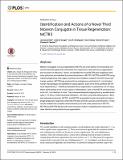| dc.contributor.author | Dalli, Jesmond | en_US |
| dc.contributor.author | Sanger, Julia M. | en_US |
| dc.contributor.author | Rodriguez, Ana R. | en_US |
| dc.contributor.author | Chiang, Nan | en_US |
| dc.contributor.author | Spur, Bernd W. | en_US |
| dc.contributor.author | Serhan, Charles N. | en_US |
| dc.date.accessioned | 2016-03-01T19:49:31Z | |
| dc.date.issued | 2016 | en_US |
| dc.identifier.citation | Dalli, Jesmond, Julia M. Sanger, Ana R. Rodriguez, Nan Chiang, Bernd W. Spur, and Charles N. Serhan. 2016. “Identification and Actions of a Novel Third Maresin Conjugate in Tissue Regeneration: MCTR3.” PLoS ONE 11 (2): e0149319. doi:10.1371/journal.pone.0149319. http://dx.doi.org/10.1371/journal.pone.0149319. | en |
| dc.identifier.issn | 1932-6203 | en |
| dc.identifier.uri | http://nrs.harvard.edu/urn-3:HUL.InstRepos:25658444 | |
| dc.description.abstract | Maresin conjugates in tissue regeneration (MCTR) are a new family of evolutionarily conserved chemical signals that orchestrate host responses to promote tissue regeneration and resolution of infections. Herein, we identified the novel MCTR3 and established rank order potencies and matched the stereochemistries of MCTR1, MCTR2 and MCTR3 using material prepared by total organic synthesis and mediators isolated from both mouse and human systems. MCTR3 was produced from endogenous substrate by E. coli activated human macrophages and identified in sepsis patients. Each of the three synthetic MCTR dose-dependently (1–100nM) accelerated tissue regeneration in planaria by 0.6–0.9 days. When administered at the onset or peak of inflammation, each of the MCTR promoted resolution of E. coli infections in mice. They increased bacterial phagocytosis by exudate leukocytes (~15–50%), limited neutrophil infiltration (~20–50%), promoted efferocytosis (~30%) and reduced eicosanoids. MCTR1 and MCTR2 upregulated human neutrophil and macrophage phagocytic responses where MCTR3 also proved to possess potent actions. These results establish the complete stereochemistry and rank order potencies for MCTR1, MCTR2 and MCTR3 that provide novel resolution moduli in regulating host responses to clear infections and promote tissue regeneration. | en |
| dc.language.iso | en_US | en |
| dc.publisher | Public Library of Science | en |
| dc.relation.isversionof | doi:10.1371/journal.pone.0149319 | en |
| dc.relation.hasversion | http://www.ncbi.nlm.nih.gov/pmc/articles/PMC4755597/pdf/ | en |
| dash.license | LAA | en_US |
| dc.subject | Biology and Life Sciences | en |
| dc.subject | Cell Biology | en |
| dc.subject | Cellular Types | en |
| dc.subject | Animal Cells | en |
| dc.subject | Blood Cells | en |
| dc.subject | White Blood Cells | en |
| dc.subject | Macrophages | en |
| dc.subject | Immune Cells | en |
| dc.subject | Immunology | en |
| dc.subject | Medicine and Health Sciences | en |
| dc.subject | Cell Processes | en |
| dc.subject | Phagocytosis | en |
| dc.subject | Infectious Diseases | en |
| dc.subject | Bacterial Diseases | en |
| dc.subject | Escherichia Coli Infections | en |
| dc.subject | Neutrophils | en |
| dc.subject | Immune Response | en |
| dc.subject | Inflammation | en |
| dc.subject | Pathology and Laboratory Medicine | en |
| dc.subject | Signs and Symptoms | en |
| dc.subject | Cell Death | en |
| dc.subject | Apoptosis | en |
| dc.subject | Biochemistry | en |
| dc.subject | Neurochemistry | en |
| dc.subject | Neurochemicals | en |
| dc.subject | Eicosanoids | en |
| dc.subject | Neuroscience | en |
| dc.title | Identification and Actions of a Novel Third Maresin Conjugate in Tissue Regeneration: MCTR3 | en |
| dc.type | Journal Article | en_US |
| dc.description.version | Version of Record | en |
| dc.relation.journal | PLoS ONE | en |
| dash.depositing.author | Chiang, Nan | en_US |
| dc.date.available | 2016-03-01T19:49:31Z | |
| dc.identifier.doi | 10.1371/journal.pone.0149319 | * |
| dash.contributor.affiliated | Chiang, Nan | |
| dash.contributor.affiliated | Serhan, Charles | |


